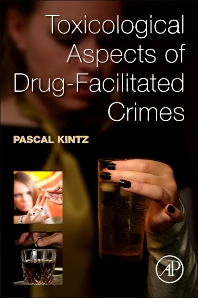Toxicological Aspects of Drug-Facilitated Crimes
1st Edition
Ouvrage collaboratif, Coordination: Pascal Kintz
Mar 2014
9780124167483

- Brings together the latest research on the toxicological analysis of drug-facilitated crimes (DFC), with real-life case studies
- Provides up-to-date analytical techniques for determining toxicity levels in blood, urine, and hair
- Covers all types of toxicants involved in DFC, including alcohol, cannabis, MDMA, and a wide variety of pharmaceuticals
Description
Toxicological Aspects of Drug-Facilitated Crimes provides readers with an overview of the field of DFC: its history, toxicological effects, analysis, interpretation of results, the roles that age, gender and race may play, and clinical presentations of these drugs. The most commonly used drugs in DFC are addressed (alcohol, cannabis, MDMA, and cocaine), as well as an emerging range of pharmaceuticals (benzodiazepines, hypnotics, sedativ
es, neuroleptics, histamine H1-antagonists, or anesthetics), which are becoming more widely used, but are more difficult to detect. Edited by a world-renowned expert in the field of Forensic and Analytical Toxicology, Pascal Kintz, this book investigates toxicants of emerging concern and brings together a number of experts in the field to address the most recent discoveries on DFC toxicology.
Chapter 1: Historical Aspects of Drug-Facilitated Crimes
Chapter 2: Epidemiology of Drug-Facilitated Crimes
Chapter 3: Drugs in DFC - Pharmacological Aspects
Chapter 4: Ethanol and DFC
Chapter 5: Memory Impairment after DFC
Chapter 6: Cannabis and DFC
Chapter 7: Drugs involved in DFC - Analytical Aspects (Blood and Urine)
Chapter 8: Drugs involved in DFC - Analytical Aspects (Hair)
Chapter 9: Case Reports in Drug-Facilitated Sexual Assaults
Chapter 10: The specific Problem of Children and Old People in DFC
Chapter 11: Clinical Aspects of DFC
